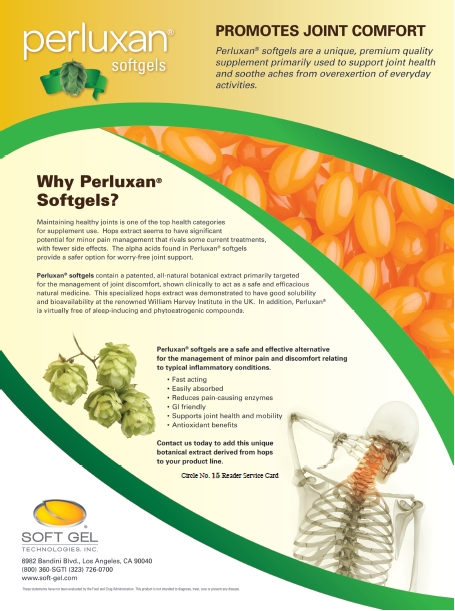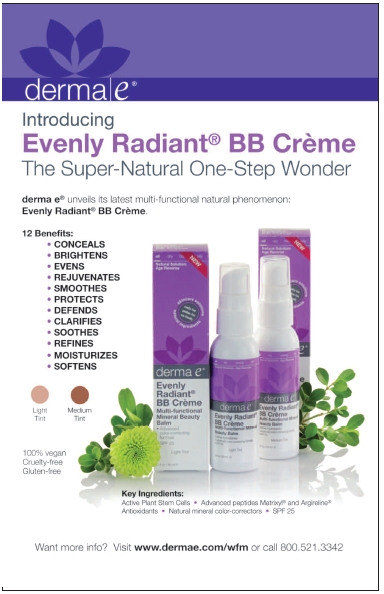The gift of life comes with the curse of aging. Some embrace their lines and wrinkles as badges of honor, while others try to fight off the beast as long as naturally possible. Those who want to keep their youthful glow may have their favorite creams, serums and lotions to ward off the look of old age, but may come to you wondering, “Is there anything else I can do?” Guide their soft-skinned hands to the supplement section and introduce them to cosmeceuticals, an internal anti-aging option that won’t involve any rubbing. Anti-aging supplements come in many different forms, some that your customers may not realize could benefit their skin from within, but all have the potential to keep your customers looking fresh and youthful for years to come.
What Are Cosmeceuticals?
Cosmeceutical is an industry term with diverse meanings. Some refer to topical beauty products with medicinal properties. In this case, we’re discussing oral cosmeceuticals that will benefit your customers from the inside-out.
Calling on Collagen
 Collagen is a structural protein that makes up about one-quarter of all proteins found in the body. Although it is found in such large quantities, as we age, collagen breaks down and production slows or depletes through other means like sun damage. There are 16 types of collagen found in the body, but 80–90% are types I, II or III, which promote tissue elasticity and stretching (1).
Collagen is a structural protein that makes up about one-quarter of all proteins found in the body. Although it is found in such large quantities, as we age, collagen breaks down and production slows or depletes through other means like sun damage. There are 16 types of collagen found in the body, but 80–90% are types I, II or III, which promote tissue elasticity and stretching (1).
Collagen molecules are made up of three-chained triple-helixes of three amino acids repeated over 1,400 times. These amino acids are glycine, proline and hydroxyproline. Then, these collagen chains are formed into long ropes and sheets that crisscross or bind together to form a network of connecting strands, all used to provide structural support for the skin and other parts of the body, like internal organs, bones, teeth, joints, tendons and soft tissues that also use collagen to connect with the skeleton (2). We’ll be focusing mostly on collagen’s benefits for skin care in this article.
Elastin (also known as elasticin) functions very similarly to collagen. It is a springy, fibrous protein made up of connective tissue that intertwines between cells and is responsible for much of the elasticity in skin, blood vessels, internal organs, tendons and ligaments (3). While collagen provides structure and stretch, elastin gives skin the ability to bounce back after being pulled. Elastin is not produced after puberty (3), so as we age, the elasticity of our skin begins to subside, leading to sagging skin, wrinkles and other telltale signs of aging. Although production stops early on in life, there are ways to slow degeneration of elastin as well as boost collagen.
Going Right to the Source
Consumers can go about using cosmeceuticals to boost collagen in two ways. One is by ingesting supplements that contain high amounts of collagen itself. Some companies claim that taking collagen directly provides better bioavailability and faster results, and can be combined with topical products also containing collagen for extra support (4). Benefits can include reducing wrinkles and fine lines, improving dry skin, increasing the amount of collagen in skin (thus increasing the strength of the dermis), improving texture and “glow” through increased blood circulation and improving skin appearance with its anti-aging properties (4). One company with a branded collagen ingredient (BioCell Collagen) states that taking a collagen supplement that combines highly bioavailable hydrolyzed collagen, hyaluronic acid and chondroitin sulfate can help keep skin structure and function healthy, as well as improve it from the inside, as opposed to being absorbed through the skin (4). Ingesting this combination, says the company, can also help protect against UV rays that can damage skin and lead to collagen loss.
This same patented formula (BioCell Collagen) was the subject of a recent case study from 2012 in Port Chester, NY, wherein 26 female subjects who showed various signs of natural aging were given one gram of the oral supplement daily for 12 weeks (5). Tests at six weeks showed a significant increase in hemoglobin and collagen in the dermis of the women, and after 12 weeks, a visual reduction in skin dryness and scaling as well as reductions of lines and wrinkles were noted. Hemoglobin remained high, while collagen content was maintained. Although more controlled studies are needed, researchers concluded that the supplement may have the ability to slow down the visual signs of natural aging (5).
As for elastin supplements, the most common practice is not taking elastin itself, but taking supplements packed with materials that help preserve elastin or help slow down the process of aging skin. This brings us to the second option.
Boost the Reserves
Option Two works more broadly: taking collagen-free supplements that can help boost collagen and/or promote younger-looking skin. This includes everything from vitamins to antioxidants, so your customers can definitely find an internal beauty regimen that fits their needs while also providing additional, full-body care benefits.
V itamins are key players in the fight against aging and are especially useful for helping to stimulate collagen production. In one study of vitamin A’s potential to protect skin from prematurely aging in the sun (called photoaging) as well as test its collagen-producing abilities, researchers took skin samples of sun-protected skin and damaged skin from 72 individuals in four age groups (18–29, 30–59, 60–79 and 80 and over years old, respectively) to first compare what damages they may have in common, then test what effect vitamin A could have on both. The results concluded that vitamin A stimulated collagen production in both sun-damaged and naturally aged skin samples (6).
itamins are key players in the fight against aging and are especially useful for helping to stimulate collagen production. In one study of vitamin A’s potential to protect skin from prematurely aging in the sun (called photoaging) as well as test its collagen-producing abilities, researchers took skin samples of sun-protected skin and damaged skin from 72 individuals in four age groups (18–29, 30–59, 60–79 and 80 and over years old, respectively) to first compare what damages they may have in common, then test what effect vitamin A could have on both. The results concluded that vitamin A stimulated collagen production in both sun-damaged and naturally aged skin samples (6).
Vitamin C plays a big role in building collagen as well. Collagen needs hydroxyproline, created by proline amino acids, which is needed for collagen to stay stable, and vitamin C is necessary in the process (2). However, because vitamin C is not created in the body, we need to maintain it with proper diet or supplementation; without vitamin C, hydroxyproline production slows and collagen production stops, causing detrimental effects in the body, even going so far as loss of teeth, easy bruising, inability to recover from daily damage and, at the most extreme, scurvy (2). Without vitamin C to help keep collagen producing normally, your customers are going to feel like swash-buckling pirates in the worst kind of way.
Naturally occurring copper peptide is another collagen booster customers should consider when looking for collagen and elastin boosters. It helps promote their production by increasing tissue-building processes while acting as an antioxidant (7). The peptide helps firm, smooth and soften skin, and studies have shown that while boosting production, it also acts as an anti-aging janitor, removing damaged collagen and elastin from the skin to make room for new cells (7).
Meanwhile, hyaluronic acid may help plump and moisturize skin.
Don’t Be So Radical!
Besides using cosmeceuticals as a way to influence collagen, they can be taken for aid against other enemies of youthful skin, such as to fight off free radicals. Free radicals are damaged cells that are missing an electron, so they attack other cells to regain their missing piece. When this happens, the free radical hurts the healthy cell, leaving it open to infection, disease or mutation, which results in abnormal growth and faster-than-normal reproduction of more damaged cells (8). Free radicals are produced naturally on a small scale, but are not harmful due to the body’s natural production of antioxidants to keep them in line. However, outside influences like cigarette smoke, food and water tainted with pesticides, excessive alcohol consumption and UV light exposure can all lead to creating more free radicals than the body can naturally handle, and, in the case of skin, cause damage to skin cells and premature aging (8).
Antioxidants are widely known for their health capabilities,  especially green and white teas. Supplementing with antioxidants like polyphenols can help keep these predators at bay. Resveratrol, a polyphenol antioxidant, has been linked to aiding many health-related problems like heart disease, diabetes and cancer (9). Its high antioxidant properties are what help suppress free radicals caused by daily, unhealthy activity, such as poor diet, and stop them from multiplying and damaging the body. Some studies suggest that resveratrol increased the longevity of mice that were fed a high-calorie diet, as they lived longer than mice on the same diet that did not receive the resveratrol supplement (9). More testing needs to be done, however, before anyone can confirm the Fountain of Youth has finally started flowing.
especially green and white teas. Supplementing with antioxidants like polyphenols can help keep these predators at bay. Resveratrol, a polyphenol antioxidant, has been linked to aiding many health-related problems like heart disease, diabetes and cancer (9). Its high antioxidant properties are what help suppress free radicals caused by daily, unhealthy activity, such as poor diet, and stop them from multiplying and damaging the body. Some studies suggest that resveratrol increased the longevity of mice that were fed a high-calorie diet, as they lived longer than mice on the same diet that did not receive the resveratrol supplement (9). More testing needs to be done, however, before anyone can confirm the Fountain of Youth has finally started flowing.
Another free radical fighter is vitamin E; like resveratrol, it acts as an antioxidant to protect against free radicals in the skin caused by outside forces like air pollution and harmful UV light (10). When ingested, vitamin E is secreted through sebum into the skin, penetrating through the many layers, and absorbs UV energy, providing photoprotection to the skin and preventing the creation of free radicals (11). In addition to combating free radicals to keep skin healthy, vitamin E also works to help your customers keep keen eyesight; it has been shown to aid in slowing down the process of early age-related macular degeneration, or vision loss for the elderly (10).
Although vitamin E is the most naturally abundant lipophilic antioxidant in the body, these E reserves decline with age as well as with prolonged exposure to UV light, making supplementation an important routine to consider, especially as skin becomes more susceptible to damage, thinness and sensitivity to the sun as we age (11).
Last, an antioxidant from French maritime pine bark (Pycnogenol from Horphag) was shown in studies to bind with collagen and elastin, and “protect skin from various harmful enzymes helping to rebuild elasticity, essential for a smooth, younger look” (12). Its antioxidant power also helps neutralize free radicals and protect skin from sunburn and photoaging.
Cosmeceuticals can be a beneficial addition to any beauty regimen when taken correctly. Have customers discuss their options with their doctors before starting to explore the supplement side of anti-aging aids. Encouraging your customers to think outside the jar with cosmeceuticals will not only boost their collagen, skin-health and confidence, but will also help you feel a boost to your sales in the supplement section. WF
References
1.Lodish H, Berk A, Zipursky SL, et al. Molecular Cell Biology. 4th edition. New York: W. H. Freeman; 2000. Section 22.3, Collagen: The Fibrous Proteins of the Matrix, http://www.ncbi.nlm.nih.gov/books/NBK21582.
2.Goodsell, David. "Collagen," Molecule of the Month, April 2000, http://www.rcsb.org/pdb/101/motm.do?momID=4.
3."Definition of Elastin," MedicineNet, http://www.medterms.com/script/main/art.asp?articlekey=24541.
4."BioCell Collagen Benefits," BioCell Technologies, http://www.biocelltechnology.com/products/biocell-collagen.
5.Schwartz, SR, Park J. “Ingestion of BioCell Collagen(®), a novel hydrolyzed chicken sternal cartilage extract; enhanced blood microcirculation and reduced facial aging signs,” Epub 2012 Jul 27, http://www.ncbi.nlm.nih.gov/pubmed/22956862
6.Varani J, Warner RL, et al. “Vitamin A antagonizes decreased cell growth and elevated collagen-degrading matrix metalloproteinases and stimulates collagen accumulation in naturally aged human skin,” The University of Michigan, 2000 Mar., http://www.ncbi.nlm.nih.gov/pubmed/10692106
7.“Understanding the Ingredients in Skin Care Products,” Cleveland Clinic, http://my.clevelandclinic.org/healthy_living/skin_care/hic_understanding_the_ingredients_in_skin_care_products.aspx.
8."How Antioxidants Work," WebMD, http://www.webmd.com/food-recipes/features/how-antioxidants-work1?page=2.
9."Resveratrol Supplements," WebMD, http://www.webmd.com/heart-disease/resveratrol-supplements
10."Vitamin E," Office of Dietary Supplements, http://ods.od.nih.gov/factsheets/VitaminE-QuickFacts.
11."Vitamin E and Skin Health," Linus Pauling Institute, http://lpi.oregonstate.edu/infocenter/skin/vitaminE.
12. http://www.pycnogenol.com/applications/skin-care/









